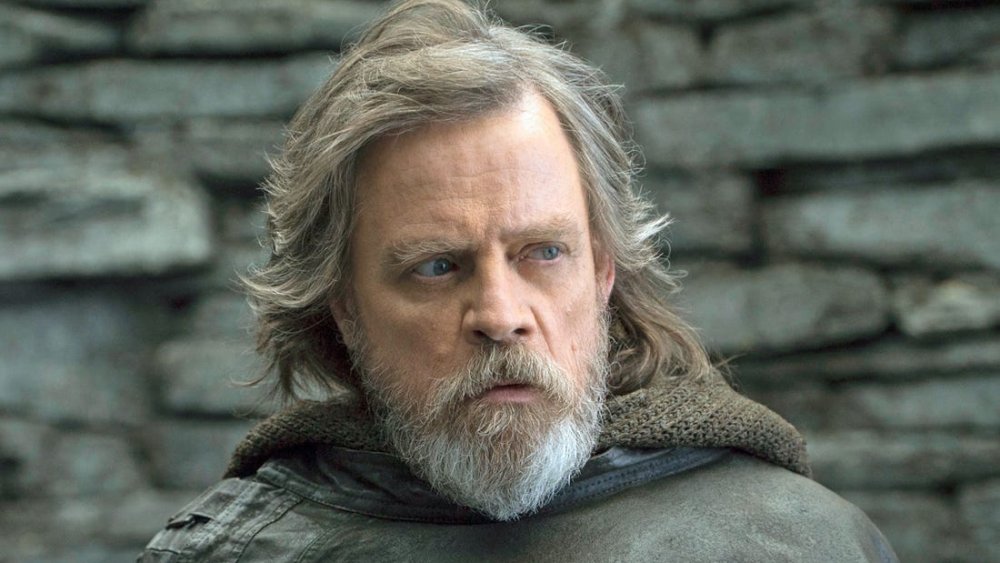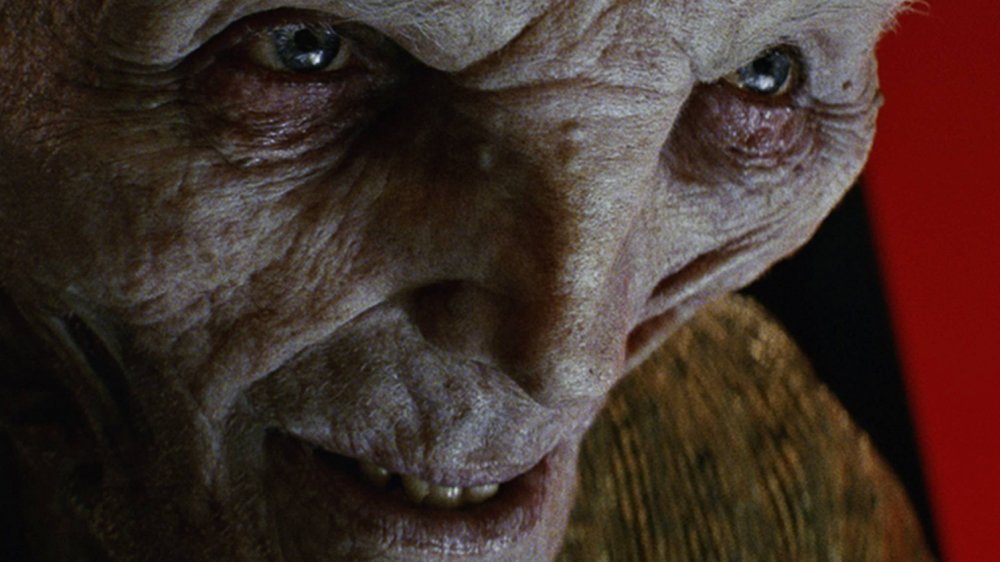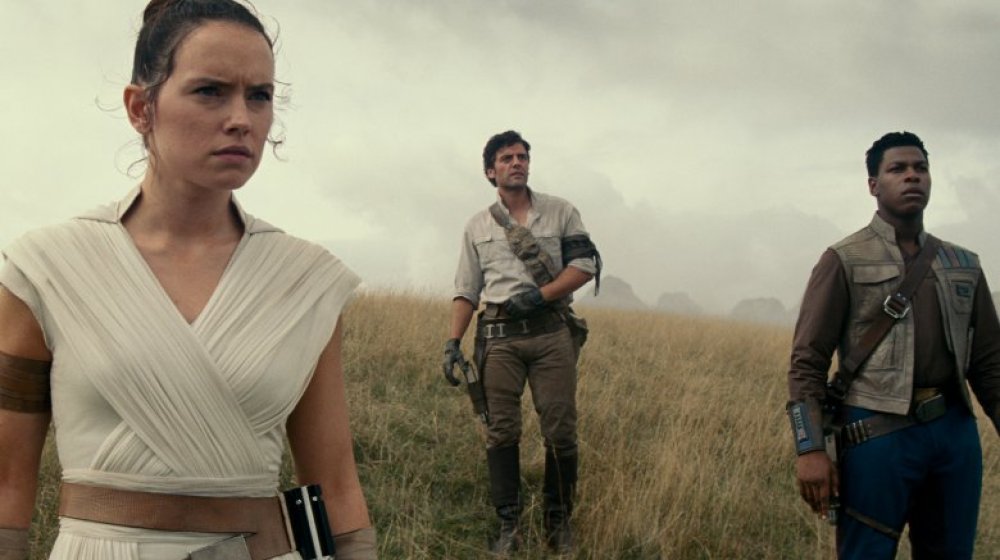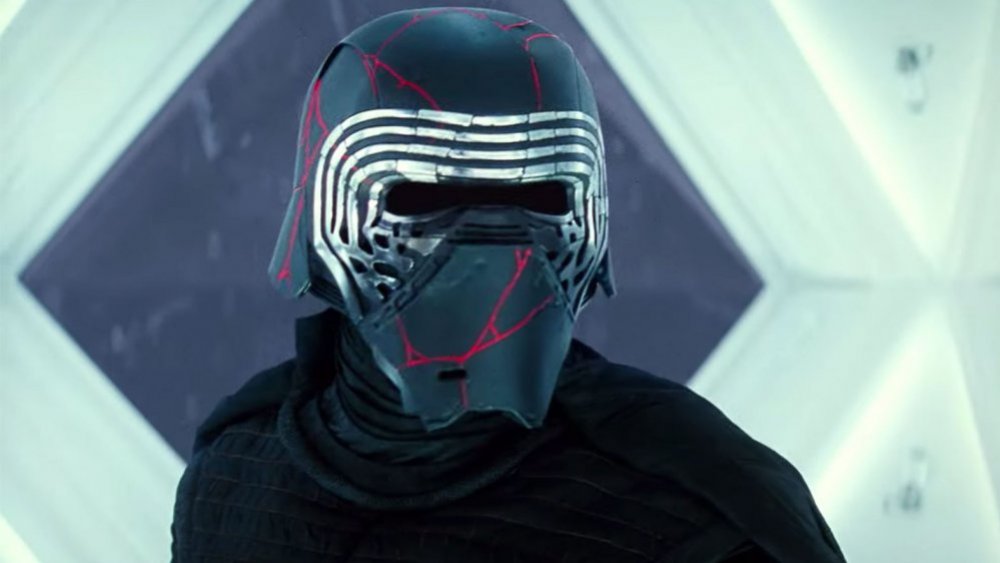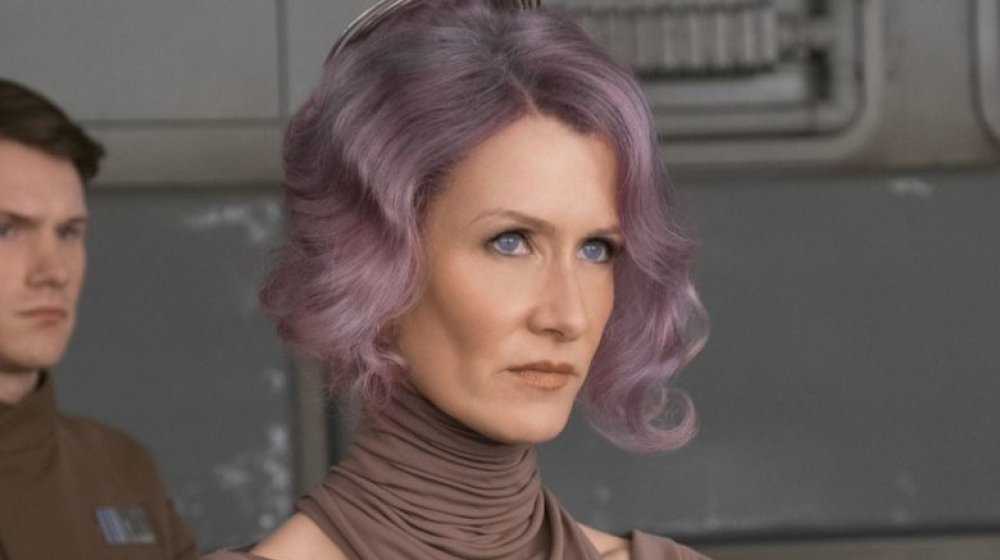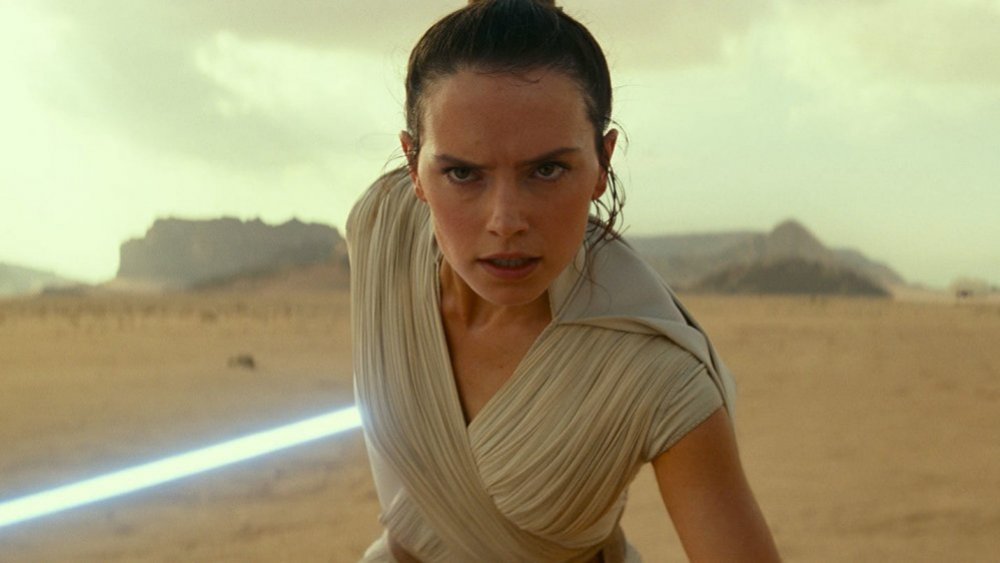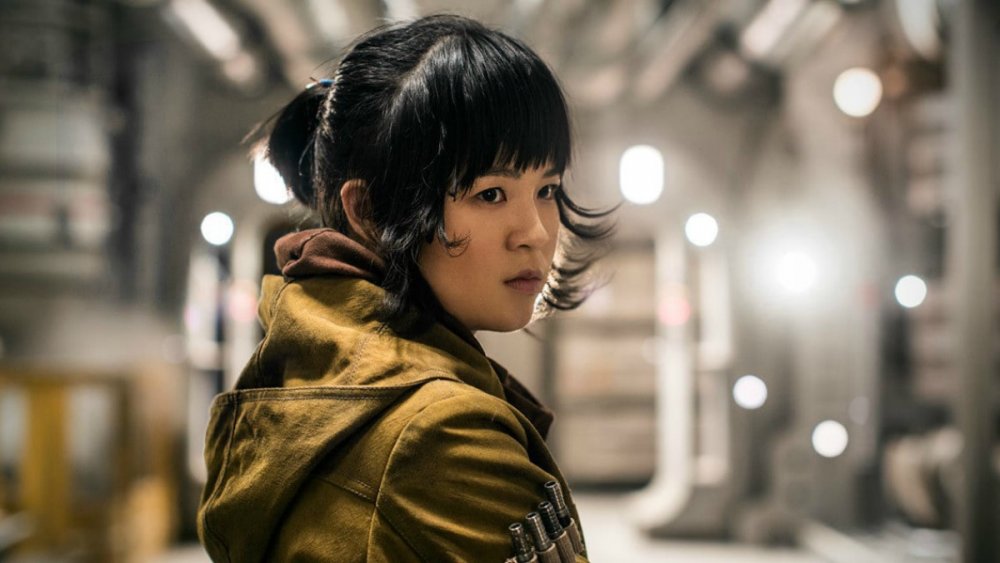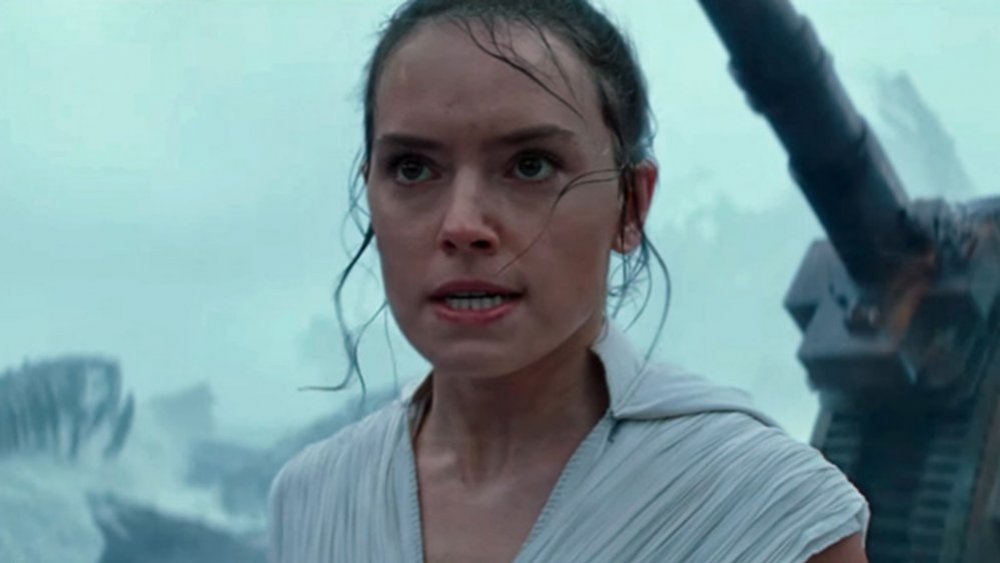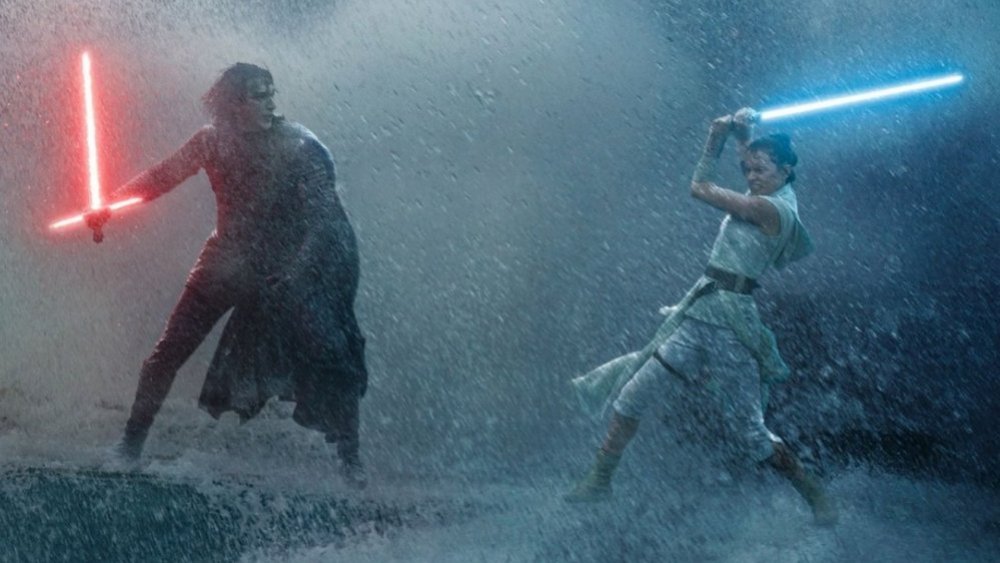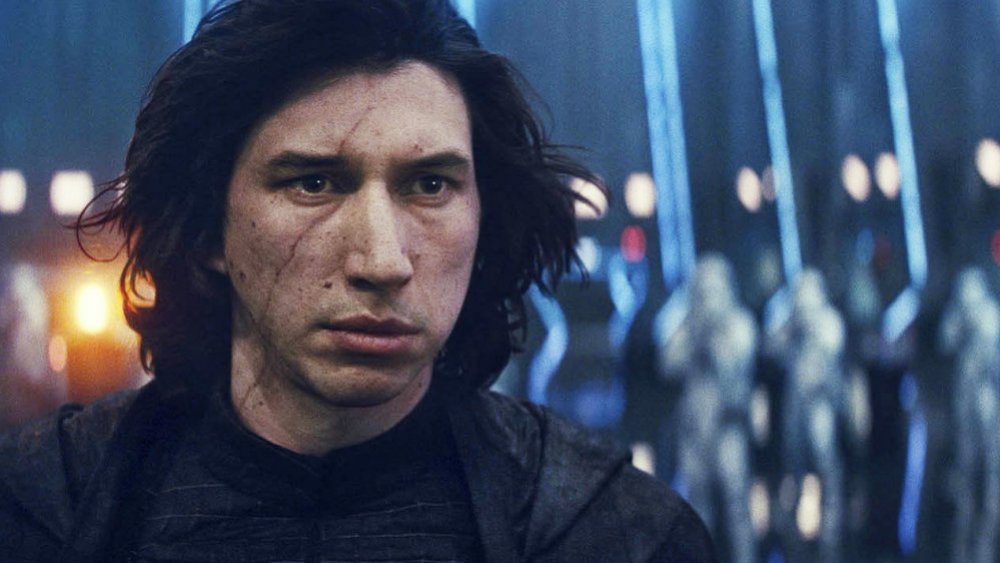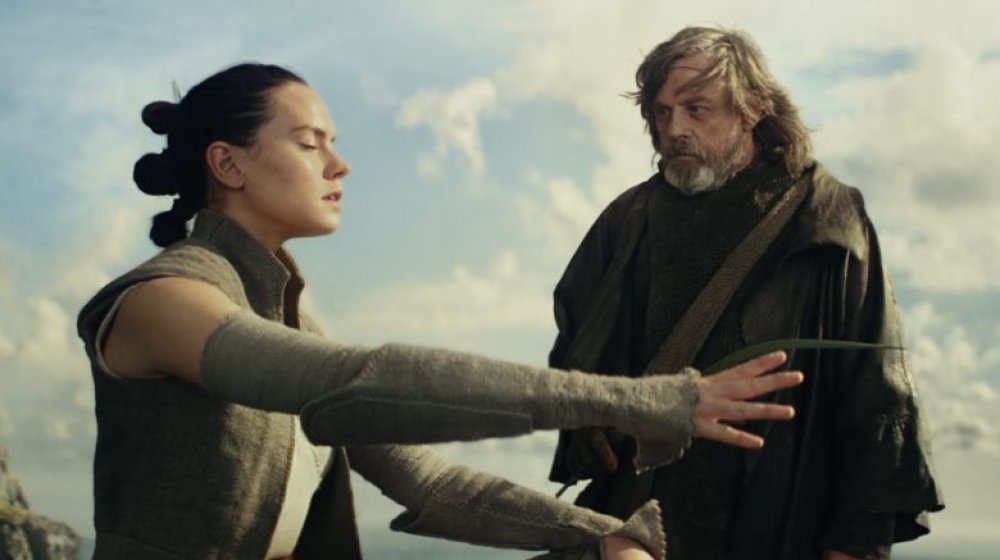All The Ways The Rise Of Skywalker Ignores The Last Jedi
When Star Wars: The Rise of Skywalker arrived in theaters worldwide on December 20, 2019, fans were curious as to how, after two years of discourse regarding The Last Jedi, director J.J. Abrams would reverse course and bring the story back to his original plan. After Abrams stepped away temporarily for the eighth episode of the Skywalker saga, he handed the film over to Rian Johnson (Knives Out, Looper, Brick), who put his own spin on the franchise, turning Star Wars on its head by throwing out some of Abrams' plotlines and taking some very real risks with the beloved franchise.
While some think Johnson's approach was fresh, innovative, and fun, a certain faction of Star Wars diehards clearly thought that Johnson had committed a cardinal sin, and ultimately, Abrams was there to back them up. After a fairly contentious press tour in the buildup to The Rise of Skywalker's release, Abrams revealed his renewed vision in the final Skywalker saga film, and in a few ways, it seems as if the director set out to erase some of the elements that some fans really loved about Episode VIII. So here are all the ways The Rise of Skywalker ignores The Last Jedi, and this should go without saying, but massive Rise of Skywalker spoilers are ahead!
The Rise of Skywalker changes the entire history of Snoke
Introduced in The Force Awakens, Snoke (played through motion capture by Andy Serkis) was once one of the most interesting and mysterious characters of the sequel trilogy, and as a result, fans were incensed when he met an ugly end during The Last Jedi. As Kylo Ren (Adam Driver) and Rey (Daisy Ridley) face the Supreme Leader of the First Order, Kylo suddenly kills his boss before decimating a room full of underlings with Rey's assistance. The scene is undoubtedly one of the standout sequences of The Last Jedi as a whole, thanks to some stunning cinematography and set design, but some fans were dismayed to see Snoke go so soon without ever learning his history.
Abrams, unwilling to let sleeping Snokes lie, resolved that mystery within seconds of the start of The Rise of Skywalker. As Kylo Ren visits Emperor Palpatine (Ian McDiarmid) in his secret lair, the camera pans over a tank full of floating, sleeping Snokes, and that's when Palpatine breaks the news: He created and engineered Snoke. The dude was nothing more than a puppet, putting to rest Snoke's previous claim that he created the connection between Rey and Ren and ending this particular mystery.
The sense of fun is back again
When the core group of characters — specifically, Rey, former Stormtrooper Finn (John Boyega), and smirking fighter pilot Poe Dameron (Oscar Isaac) — were introduced in 2015's The Force Awakens, they brought a sense of fun adventure to the seventh film. Sure, they were never in the same scene at the same time, but their enthusiasm and heroic spirit gave the story a light, zippy feel.
However, many fans complained when The Last Jedi took a darker turn. The sense of high adventure was gone, and suddenly, it felt like everyone was under siege. Poe was butting heads with General Holdo (Laura Dern) as the First Order hunted them down. Rey went on a solo quest and ended up on an isolated planet with a cranky Luke Skywalker (Mark Hamill). Everything was more intense, more claustrophobic, and the stakes were much more dire. And while that definitely worked for some fans, others missed the swashbuckling of Episode VII.
However, The Rise of Skywalker returns to The Force Awakens' roots. In fact, it discards that siege mentality completely and brings the trio of main characters together for the very first time. The result gives the movie much more levity, especially when it lets Poe and Finn riff off of each other. It also makes it clear that these three are supposed to be the new Han, Luke, and Leia, but it also ends up sidelining Poe and Finn multiple times as Rey surges forward to save the day.
Kylo's helmet survived The Last Jedi
In the grand tradition of his grandfather, Darth Vader, Kylo Ren introduced a helmet for a new generation of Star Wars villains in 2015's The Force Awakens, showing off a sleek, black and silver look meant to evoke one of the most famous bad guys of all time. However, during The Last Jedi, when Supreme Leader Snoke basically tells him that his headgear looks kind of stupid, Kylo destroys the helmet, smashing it during a melodramatic tantrum.
In a pretty shameless move seemingly meant to erase this entire sequence from Star Wars canon, Abrams reverses course on the helmet entirely, going so far as to get Kylo and his crew to basically glue the helmet back together. Though Kylo later abandons the helmet — along with his entire First Order outfit — once he changes course to become Ben Solo once again, it's still restored as a motif after being an important factor in the first film. Obviously, Abrams didn't agree with some of the choices that Johnson made during The Last Jedi, but the return of the helmet does seem like one of his pettier reversals.
The legacy of Holdo
Introduced in The Last Jedi, Vice Admiral Holdo (Laura Dern) is chosen to aid and later replace General Leia Organa (Carrie Fisher), but she constantly butts heads with Poe, who wants to take a much more aggressive approach when fighting against the First Order's massive army. Holdo's plan is to evacuate as many Resistance allies and fighters as possible using smaller transports, and though Poe thinks her plan is way too timid to work, she has one last trick up her sleeve. At the last minute, Holdo remains on the Resistance's main ship alone, using it as a decoy and sacrificing herself to save an entire cause.
One might think that Holdo's incredible act might warrant some sort of fanfare, but The Rise of Skywalker does away with this notion pretty speedily. When discussing the best tactics for attacking the still-enormous First Order, it's suggested that the Resistance could use a "Holdo maneuver," an idea which is shut down almost immediately because it couldn't possibly work. It would've been kind of boring to use the exact same trick as they did before, but it also feels pretty insulting that Holdo only gets one mention in this film, especially one immediately met with derision.
Deus ex Rey
In the middle film of both the original and sequel trilogy — specifically, The Empire Strikes Back and The Last Jedi — plenty of attention is paid to Jedi training, with Luke studying under Yoda in the first and Rey training under an unwilling Luke in the second. Meant to show the audience the sheer amount of work and willpower it takes to become a Jedi, these training sequences can be incredibly satisfying when they build to a huge payoff, but when it comes to Rey's evolution, something is simply missing.
Ultimately, The Rise of Skywalker finds a way to explain Rey's tremendous power thanks to her famous lineage, but right at the beginning of the film, Rey seems like she's losing her grip on the Force. However, mere scenes later, she's able to Force-hold a First Order ship in midair as she and Kylo Ren play tug-of-war, and she also suddenly has healing powers, which uses her essence to give new life to wounded animals and humans. Since we never really saw Luke discuss these particular powers with Rey, not only are the impacts of these powers lessened, but it also simply seems as if Rey developed a new skill when the plot called for it rather than any of these powers having a solid root in the narrative.
The Rise of Skywalker pretty much ignores Rose Tico
One of the biggest and most disappointing overcorrections in The Rise of Skywalker is, undoubtedly, the way that the narrative treats Rose Tico. A bright, scrappy mechanic introduced in The Last Jedi, Rose proves to be an invaluable and loyal ally to Finn as they try to escape the clutches of the First Order, and during the film's enormous final battle, she's important enough to be on the front lines with Poe and Finn. After saving Finn from a suicide mission in his speeder, the two even share a passionate kiss, which the film built to throughout their brief relationship.
After The Last Jedi was released, actress Kelly Marie Tran endured some of the cruelest and worst abuse at the hands of Star Wars fans, even quitting social media after it all became too much. And unfortunately, Abrams seems to have validated those opinions in The Rise of Skywalker. Rose is relegated to the background for the entire film, staying away from important missions for no reason at all and basically serving as a glorified extra with just a few lines. Considering what Tran went through over her role, it's insulting and hugely disappointing that Abrams simply saw fit to cut her character out of the action all together.
Rey's backstory is totally rewritten
Fans were dismayed and disappointed during The Last Jedi when, after tons of buildup during The Force Awakens, Kylo Ren reveals to Rey that her parents are simply "nobodies," a couple of drunks who sold her off for petty cash. In perhaps the boldest move in the entire sequel trilogy, Johnson tried to present a Star Wars universe in which you don't have to be "special" or come from a famous family to be skilled in the Force, but you can be anybody as long as you possess the power within you.
Despite Johnson's best efforts, Abrams majorly walked back this decision the second he returned to direct The Rise of Skywalker. In another confession, Kylo tells Rey that her parents were simply pretending to be nobody. In fact, her father was the son of Palpatine — making the Emperor Rey's grandfather — and they sacrificed themselves to save her in a very Harry Potter-esque twist. Johnson swung huge with his decision, and in the end, it feels disappointing and anticlimactic to many fans that this entire plotline from the movie was erased in favor of bringing back the original big bad.
Luke, his lightsaber, and taking aim at The Last Jedi
One of the most stunning sequences in all of The Last Jedi comes when Kylo Ren, after capturing Rey, brings her to see Supreme Leader Snoke. Kylo is then ordered by his boss to kill the budding Jedi, but in one of the best movie twists of the last decade, he kills Snoke instead. After he and Rey decimate the leader's remaining forces, he offers her his hand, saying they can rule the galaxy forever. Rey refuses, and the two engage in a brutal Force tug-of-war that ends up destroying Luke Skywalker's fabled lightsaber, seemingly for good. While it's implied that Leia fixed the lightsaber, nobody ever addresses its ruin in The Rise of Skywalker, and it simply reappears in the narrative.
The more obvious Last Jedi snub, however, comes when Rey returns to Ahch-To (the solitary planet where she trained with Luke) to run away from her Jedi powers just like he did. As she prepares to throw her saber into the flames, Luke's Force ghost appears and admonishes her, saying she should treat the weapon with more respect — which serves as a very obvious reference to the moment in The Last Jedi where Luke tosses his own saber over his shoulder dismissively.
Kylo's redemption
After he killed his father, massacred the remaining Jedi, and pledged his life to the First Order's cause, nobody left The Last Jedi thinking that Kylo Ren could redeem himself in any possible way. Adam Driver, the man behind the villain, even said so himself in the lead-up to The Rise of Skywalker, claiming that Kylo couldn't be redeemed at all. But in the end, The Rise of Skywalker changed its tune on that, too.
When Rey explains to Kylo during one of their many battles that she would've taken his hand and ruled the universe with him if he'd offered Ben Solo's hand instead of Kylo Ren's, the leader of the First Order clearly suffers a crisis of conscience, struggling to find a way back to his roots after years within the Dark Side. Ultimately, with a little help from Han, he re-emerges as a hero, fighting alongside Rey to take down the Emperor and even sacrificing his own life to revive Rey after the effort to defeat Palpatine kills her. Unfortunately for audiences, despite an unexpectedly layered performance from Driver, this plotline moves at warp speed and doesn't feel particularly earned, especially after Kylo Ren seemed to commit to a lifetime of evil during The Last Jedi.
Familiar characters return in The Rise of Skywalker somehow
During the sequel trilogy, each of the main members of the original Star Wars trio has seemingly exited the franchise for good. Han Solo met his end at the hands of his own son in The Force Awakens, Luke sacrificed himself to help the Resistance army by using a Force projection in The Last Jedi, and Carrie Fisher's tragic death in 2016 led to an abbreviated, cobbled-together role in The Rise of Skywalker. However, the final film manages to find a way to bring all three of them back somehow, relying heavily on the past to tell this new story.
Fisher was always going to appear in the film, thanks to leftover footage which created a small arc for the late actress, but fans were likely surprised to see Hamill and Ford show up as well. Ford's appearance is definitely the odder one. After Rey heals a fatal wound she dealt to Kylo Ren and gets away, Han appears in his son's memory to convince him to find the right path. As for Luke, it's not entirely shocking that he returns as a Force ghost to speak to Rey, but it is a bit jarring that Abrams saw fit to bring the entire trio back for one last nostalgic moment.
